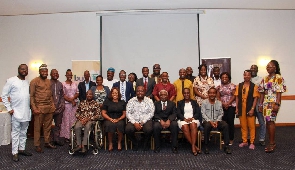Between December 2019 and January 12, 2020, a respiratory illness wreaking havoc among a cluster of people in Wuhan, China, was recorded and, by January 30, declared a global pandemic by the World Health Organization.
The death toll was unprecedented, only rivalled by the Black Death in the 1300s. Moreover, the pandemic took the most exacting toll on governments worldwide and revealed, rather glaringly, the state of unreadiness of governments in the face of such a global nightmare.
Health systems worldwide were tested more than ever, and resilience strings stretched thin.
The situation was even direr in this part of the world, considering the precarious position of most health systems on the continent of Africa. Quality health care is still an ideal and not a reality for the whole continent, likewise the state of accountability mechanisms in such a context.
For the first time, resources were pooled together from varied sources to equip the government with what it needed to combat the virus and mitigate its debilitating effects on Ghana's economy and people. Yet, the big question remains, 'Where did the money go?'
A glance at the 2022 national budget reveals millions of Ghana Cedis allocated for COVID-19 relief measures, yet interactions with the Ghanaian people tell a different story.
Again, the arrival of the COVID-19 vaccine was welcome news. The main issue was equity in distribution, and yet the problem of hesitancy endangers the government's goal of herd immunity, so what can be done?
Addressing these issues, BudgIT Ghana 2021 launched the COVID-19 Transparency and Accountability Project (CTAP) as a Civil Society coordinated effort to probe into COVID-19 expenditures and initiatives to promote and boost health sector accountability. In 2021, Phase I of the project was executed, focusing mainly on institutional and stakeholder engagement. In addition, 2022 saw Phase II honing in on the Vaccine Dimension. The focus was boosting health sector accountability as well as vaccine equity distribution and battling hesitancy and misinformation.
BudgIT Ghana unveiled two significant health sector reports and launched them in a Press Conference at the Alisa Hotel, Accra.
On January 31, 2023, civil society actors converged at the Fiesta Royale Hotel to discuss stakeholders' role in Boosting Health Sector Accountability and Battling Vaccine Misinformation in Ghana.
In participation were the Ghana Health Service, the Ministry of Health, the National COVID-19 Trust Fund, the Noguchi Memorial Institute, the Civil Society Platforms on Health and the Sustainable Development Goals, the Open Governance Partnership Secretariat, Revenue Mobilization Africa, the Swiss Chamber of Commerce, the International Human Rights Commission and a host of civil society organizations.
In a comment on Vaccine Accountability, Prof. Ben Adu Gyan of the Noguchi Memorial Institute highlighted the relevance of looking out for accountability in the distribution of vaccines and accountability in the efficacy of vaccines utilised in the fight against the virus. He outlined the role of institutions like the Noguchi Memorial Institute in the fight against Vaccine Misinformation. He said, "Every day, we hear new theories and assertions about what these vaccines do. Therefore, we must consolidate the vaccine education effort."
Dr Michael Biney, from the Platform for Civil Society Organisations in Health and a member of Curious Minds Ghana, outlined the reality of administering and taking vaccines. " The conspiracy theories are countless and increasing daily—stories of infertility, loss of sex drive, menstrual irregularities etc. The truth is vaccines are made for our good and not otherwise. Most reactions are from our bodies because of how it receives the vaccine. Reactions manifest differently, but they don't mean vaccines are out to make Africans sterile or barren."
Dr William Collins Asare of the COVID-19 National Trust Fund spoke on the need for such meetings to be stakeholder holistic and was impressed with the comprehensive stakeholder participation at the event. " Most events like these, especially by think tanks and NGOs, do not bother to include institutions like the Ghana Health Service when the subject matter to be discussed is on health, which is quite ridiculous, so I am thrilled that they are here today with all of us." He went on to stress the need for Civil Society to be more unified and collaborated if ideals and objectives were to be met.
The team presented the project briefing and research findings on Phase II of the CTAP Project in a comprehensively detailed presentation at the meeting, which set the stage for the most engaging forum on the subject matter.
Media houses that covered the event were Multimedia Group Limited, GhanaWeb, Original TV and Radio, Pink FM, SikapaTimes, Accra FM, and Rainbow Radio.
Health News of Monday, 6 February 2023
Source: BudgIT Ghana

















